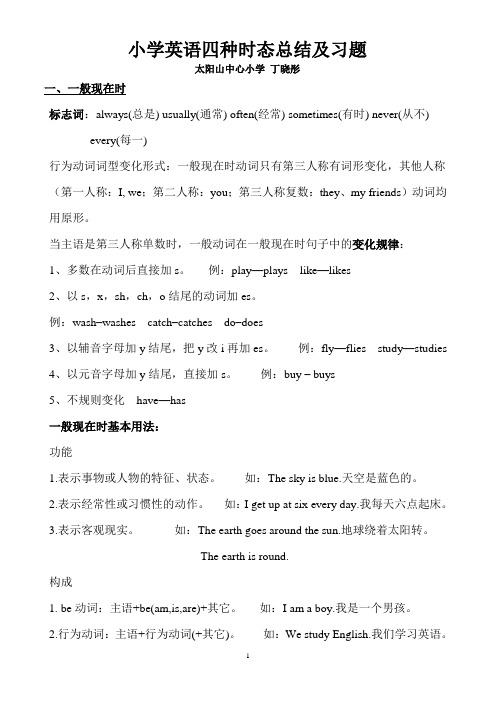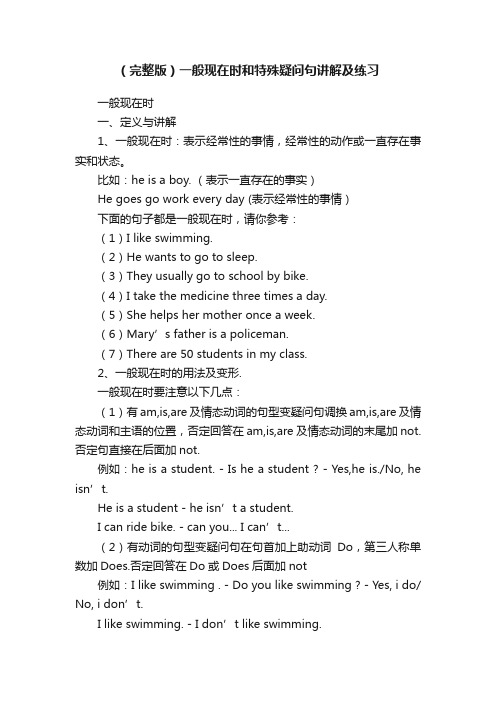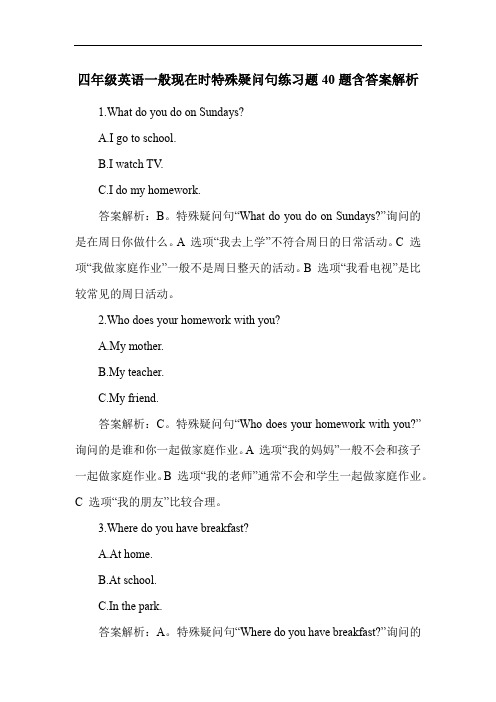一般现在时和特殊疑问句讲解及练习
一般现在时和一般过去时精讲+练习题

一、一般现在时(一)概念:表示经常性或习惯性的动作,或存在的状态1、肯定句:主语+谓语+其他。
She reads English everyday .2、否定句:主语+don’t/doesn’t+谓语+其他。
He doesn’t get up at 6:30 in the morning .3、一般疑问句:Do/Does+主语+V原+其他?Do you like English ? Yes, I do. /No, I don’t .4、特殊疑问句:特殊疑问词+do/does+主语+V原+其他?What time do you get up every morning ?Where does your father work ?(四)具体用法1、表示经常性或习惯性的动作,或存在的状态,常与表示频率的时间状语如:often , sometimes , usually,always , seldom,never, every day /year/month...), once/twice a week (month , year , etc.) , on Sundays等连用。
I leave home for school at seven every morning .2、在以when,if, as soon as, as long as等连词引导的从句中,当主句的谓语动词是一般将来时,那么从句的谓语动词通常用一般现在时来表示将来要发生的动作。
(主将从现)I'll tell him the news when he comes back. 他回来时,我将告诉他这个消息。
If you come this afternoon,we’ll have a meeting.今天下午如果你来,我们就开个会。
3、描述事物的状态、性质、特征等,例如:The door is open. 门是开着的。
The apple is sweet.这个苹果是甜的。
(完整版)小学英语四种时态练习题丁晓彤

小学英语四种时态总结及习题太阳山中心小学丁晓彤一、一般现在时标志词:always(总是) usually(通常) often(经常) sometimes(有时) never(从不) every(每一)行为动词词型变化形式:一般现在时动词只有第三人称有词形变化,其他人称(第一人称:I, we;第二人称:you;第三人称复数:they、my friends)动词均用原形。
当主语是第三人称单数时,一般动词在一般现在时句子中的变化规律:1、多数在动词后直接加s。
例:play—plays like—likes2、以s,x,sh,ch,o结尾的动词加es。
例:wash–washes catch–catches do–does3、以辅音字母加y结尾,把y改i再加es。
例:fly—flies study—studies4、以元音字母加y结尾,直接加s。
例:buy – buys5、不规则变化have—has一般现在时基本用法:功能1.表示事物或人物的特征、状态。
如:The sky is blue.天空是蓝色的。
2.表示经常性或习惯性的动作。
如:I get up at six every day.我每天六点起床。
3.表示客观现实。
如:The earth goes around the sun.地球绕着太阳转。
The earth is round.构成1. be动词:主语+be(am,is,are)+其它。
如:I am a boy.我是一个男孩。
2.行为动词:主语+行为动词(+其它)。
如:We study English.我们学习英语。
句型肯定句:A. be动词:主语+ be + 其它成分如:He is a worker.B.行为动词:主语+动词(注意人称变化) +其它成分如:We like the little cat.否定句:A. be动词:主语+ be + not +其它成分如:They are not students.B.行为动词:主语+助动词(do/does) + not +动词原形+其它成分如:We don’t like the little cat.一般疑问句:A. be动词:Am / Is /Are +主语+ 其它成分如:Are you a teacher? Yes, I am. / No, I am not.Are they students of your school?Yes they are / No they aren’t.B.行为动词:助动词(Do/Does)+主语+动词原形+ 其它成分如:Do you like it? Yes, I do. / No. I don’t .Does he(she) like it? Yes, he( she )does. / No, he ( s he )doesn’t.特殊疑问句:疑问词+ 一般疑问句A. be动词:How many students are there in your school?B.行为动词:What do you usually do on Sunday?一般现在时动词be和have的变化形式1.动词Be 用法:第一人称单数用am,第三人称单数用is,其它人称用are。
(完整版)一般现在时和特殊疑问句讲解及练习

(完整版)一般现在时和特殊疑问句讲解及练习一般现在时一、定义与讲解1、一般现在时:表示经常性的事情,经常性的动作或一直存在事实和状态。
比如:he is a boy. (表示一直存在的事实)He goes go work every day (表示经常性的事情)下面的句子都是一般现在时,请你参考:(1)I like swimming.(2)He wants to go to sleep.(3)They usually go to school by bike.(4)I take the medicine three times a day.(5)She helps her mother once a week.(6)Mary’s father is a policeman.(7)There are 50 students in my class.2、一般现在时的用法及变形.一般现在时要注意以下几点:(1)有am,is,are及情态动词的句型变疑问句调换am,is,are及情态动词和主语的位置,否定回答在am,is,are及情态动词的末尾加not.否定句直接在后面加not.例如:he is a student. - Is he a student ? - Yes,he is./No, he isn’t.He is a student - he isn’t a student.I can ride bike. - can you... I can’t...(2)有动词的句型变疑问句在句首加上助动词Do,第三人称单数加Does.否定回答在Do或Does后面加not例如:I like swimming . - Do you like swimming ? - Yes, i do/ No, i don’t.I like swimming. - I don’t like swimming.(3)第三人称单数在动词的末尾要加s或es,以s,ch,sh结尾的单词加es,特殊单词特殊记.例如:He goes to school at 7:00 every day.要特别注意在什么情况要使用一般现在时.现在请你完成一些练习,让你更熟练地掌握一般现在时:(一).用动词的适当形式填空1. She _________(go) to school at seven o’clock.3. He usually ___________ up at 17:00.(get )4. She ___________ (live) in Beijing.7. My father __________ (watch) TV every evening .9.________ Amy _________ (read) English every day10. Chen Jie sometimes _________(go)to the park with her sister.(二).选择填空1.I want____homework now.A. doingB. to doC. to do myD. do my2.It's time______.A. go to schoolB. play gamesC. to go homeD. to do my homeworks3.______go and help her.A. Let's meB. Let's usC. Let'sD. Let's to4.Do they have a new car? Yes,_____.A .they are B.they have C. they don't D. they do5.He often _________ supper at 6:00 in the evening.A. haveB. has c. is having D. is eating6. We _____________ any Chinese classes on Friday.A. are havingB. aren’t havingC. don’t haveD. are have(三)、用括号内动词的适当形式填空。
一般现在时的一般疑问句和特殊疑问句

和特殊疑问句
熟练掌握一般现在时的疑问句,是学好英语的第一步。在这个演示中,我会
介绍一些常用的一般疑问句和特殊疑问句的表达方式,以及一些语法重点。
一般现在时的一般疑问句
Breakfast Habits
Exercise Routine ♀️
What do you usually eat for breakfast?
Free Time
What do you do in your free time?
The Big Picture
1
Life Goals
2
What is your ultimate goal in life?
3
Values
Motivations ️
Why did you choose this career path?
Music
Who is your favorite singer?
Colors
Which color do you like the most?
Opinions
What is your opinion on this matter? What do you think about the current situation?
communicate more
your language learning
effectively and build
goals. Keep practicing and
stronger relationships with
you'll be fluent in no time!
those around you.
江苏中考英语复习之初中英语主要时态系列(一)—— 一般现在时讲解及练习

一、一般现在时有三种形式1. 谓语是be(am/is/are)的一般现在时。
①肯定形式:主语+be+表语(形容词、名词充当表语)。
I am hungry.You are beautiful.He is a doctor.②否定形式:主语+be+not+表语(形容词、名词充当表语)。
I am not hungry.You aren't beautiful.He isn't a doctor.③一般疑问句形式:Be+主语+表语(形容词、名词充当表语)? 肯定回答:Yes,主语+be. 否定回答:No, 主语+ be+not.—Are you hungry?—Yes,I am./No,I'm not.—Is he a doctor?—Yes, he is./No, he isn,t.④特殊疑问句形式:特殊疑问词+Be开头的一般疑问句?—What is he?—He is a doctor.注意:be要随着主语变。
2. 谓语动词是实义动词(及物动词或不及物动词)的一般现在时。
①肯定形式:“主语+及物动词+宾语”或“主语+不及物动词”。
She has a little brother.她有一个弟弟。
The sun rises in the east.太阳从东方升起。
②否定形式:“主语+don't/doesn't+及物动词+宾语”或“主语+don't/doesn't+不及物动词”。
She doesn't have a little brother.她没有弟弟。
I don't eat every morning.我每天早晨都不吃饭。
③一般疑问句形式:“Do/Does+主语+及物动词原形+宾语”或“Do/Does+主语+不及物动词原形”。
肯定回答:Yes,主语+do/does. 否定回答是:No, 主语+ don't/doesn't.—Do you eat every morning?—Yes, I do./No, I don't.—Does she have a little brother?—Yes, she does./No, she doesn't.④特殊疑问句:特殊疑问词+do/does开头的一般疑问句?What do you like?When do you go to school?注意:根据主语确定用do还是does。
初一英语上学期语法一般疑问句及特殊疑问句

例:Do Thomas come here everday? Yes, he does./ No ,he doesn’t.
Is Lin Lin in Class 3? Yes, she is. / No, she isn′t.或(No, she′s not).
特殊疑问句
点击此处添加正文,文字是您思想的提炼,为了演示发布的良好效果,请言简意赅的阐述您的观点。点击此处添加正文,文字是您思想的提炼,为了演示发布的良好效果,请言简意赅的阐述您的观点。
6
→Is your father playing soccer?
7
如果陈述句中有some, 则变问句时往往要变成any 。
例: There is some water on the playground.
→Is there any water on the playground?
如果句中含有实义动词have且表示“有”时, 使用do
陈述句变一般疑问句应注意的事项
1
陈述句变成一般疑问句除了遵循上述规则以外,还应注意下列几点:
小学英语语法时态归纳及练习(含答案解析)

英语时态归纳一、一般现在时:标志词:often(经常) sometimes(有时) always(总是) usually(通常) never(从不) every(每一)行为动词词型变化形式:一般现在时动词只有第三人称有词形变化;其他人称(第一人称:I, we;第二人称:you;第三人称复数:they、my friends)动词均用原形。
当主语是第三人称单数时,一般动词在一般现在时句子中的变化规律:1、多数在动词后加s:play—plays like—likes ,2、以s,x,sh,ch,o结尾的动词加es wash–washes catch–catches do–does3、以辅音字母加y结尾,把y改i再加es fly—flies study—studies4、以元音字母加y结尾,直接加s buy – buys5、不规则变化have—has一般现在时基本用法功能1.表示事物或人物的特征、状态。
如:The sky is blue.天空是蓝色的。
2.表示经常性或习惯性的动作。
如:I get up at six every day.我每天六点起床。
3.表示客观现实。
如:The earth goes around the sun.地球绕着太阳转。
The earth is round.构成1. be动词:主语+be(am,is,are)+其它。
如:I am a boy.我是一个男孩。
2.行为动词:主语+行为动词(+其它)。
如:We study English.我们学习英语。
句型肯定句:A.be动词:主语+ be + 其它成分He is a worker.B.行为动词:主语+动词(注意人称变化) +其它成分We like the little cat.否定句:A.be动词:主语+ be + not+其它成分They are not students.B.行为动词:主语+助动词(do/does) + not+动词原形+其它成分We don’t like the little cat.一般疑问句:A.be动词:Am / Is /Are +主语+ 其它成分Are you a teacher? Yes, I am. / No, I am not.Are they students of your school. Yes, they are / No they aren’t.B.行为动词:助动词(Do/Does)+主语+动词原形+ 其它成分Do you like it? Yes, I do. / No. I don’t .Does he(she) like it? Yes, he( she )does. / No, he ( she )doesn’t.特殊疑问句:疑问词+ 一般疑问句A.be动词:How many students are there in your school?B.行为动词:What do you usually do on Sunday?一般现在时动词be和have的变化形式1.动词Be 叫连系动词, 用法:第一人称单数用am,第三人称单数用is,其它人称用are。
四年级英语一般现在时特殊疑问句练习题40题含答案解析

四年级英语一般现在时特殊疑问句练习题40题含答案解析1.What do you do on Sundays?A.I go to school.B.I watch TV.C.I do my homework.答案解析:B。
特殊疑问句“What do you do on Sundays?”询问的是在周日你做什么。
A 选项“我去上学”不符合周日的日常活动。
C 选项“我做家庭作业”一般不是周日整天的活动。
B 选项“我看电视”是比较常见的周日活动。
2.Who does your homework with you?A.My mother.B.My teacher.C.My friend.答案解析:C。
特殊疑问句“Who does your homework with you?”询问的是谁和你一起做家庭作业。
A 选项“我的妈妈”一般不会和孩子一起做家庭作业。
B 选项“我的老师”通常不会和学生一起做家庭作业。
C 选项“我的朋友”比较合理。
3.Where do you have breakfast?A.At home.B.At school.C.In the park.答案解析:A。
特殊疑问句“Where do you have breakfast?”询问的是你在哪里吃早餐。
B 选项“在学校”一般不在学校吃早餐。
C 选项“在公园”也不是吃早餐的常见地点。
A 选项“在家”是比较合理的。
4.When do you get up in the morning?A.At 6:00.B.At 7:00.C.At 8:00.答案解析:B。
特殊疑问句“When do you get up in the morning?”询问的是早上你什么时候起床。
根据一般小学生的起床时间,7 点比较合理。
A 选项6 点有点早,C 选项8 点可能上学就迟到了。
5.How do you go to school?A.By bus.B.By bike.C.On foot.答案解析:A。
- 1、下载文档前请自行甄别文档内容的完整性,平台不提供额外的编辑、内容补充、找答案等附加服务。
- 2、"仅部分预览"的文档,不可在线预览部分如存在完整性等问题,可反馈申请退款(可完整预览的文档不适用该条件!)。
- 3、如文档侵犯您的权益,请联系客服反馈,我们会尽快为您处理(人工客服工作时间:9:00-18:30)。
一般现在时一、定义与讲解1、一般现在时:表示经常性的事情,经常性的动作或一直存在事实和状态。
比如:he is a boy. (表示一直存在的事实)He goes go work every day (表示经常性的事情)下面的句子都是一般现在时,请你参考:(1)I like swimming.(2)He wants to go to sleep.(3)They usually go to school by bike. (4)I take the medicine three times a day. (5)She helps her mother once a week. (6)Mary’s father is a policeman. (7)There are 50 students in my class.2、一般现在时的用法及变形.一般现在时要注意以下几点:(1)有am,is,are及情态动词的句型变疑问句调换am,is,are及情态动词和主语的位置,否定回答在am,is,are及情态动词的末尾加not.否定句直接在后面加not.例如:he is a student. - Is he a student ? - Yes,he is./No, he isn’t.He is a student - he isn’t a student.I can ride bike. - can you... I can’t...(2)有动词的句型变疑问句在句首加上助动词Do,第三人称单数加Does.否定回答在Do 或Does后面加not例如:I like swimming . - Do you like swimming ? - Yes, i do/ No, i don’t.I like swimming. - I don’t like swimming.(3)第三人称单数在动词的末尾要加s或es,以s,ch,sh结尾的单词加es,特殊单词特殊记.例如:He goes to school at 7:00 every day.要特别注意在什么情况要使用一般现在时.现在请你完成一些练习,让你更熟练地掌握一般现在时:(1).用动词的适当形式填空1. She _________(go) to school at seven o’clock.3. He usually ___________ up at 17:00.(get )4. She ___________ (live) in Beijing.7. My father __________ (watch) TV every evening .9.________ Amy _________ (read) English every day10. Chen Jie sometimes _________(go)to the park with her sister.(二).选择填空1.I want____homework now.A. doingB. to doC. to do myD. do my2.It's time______.A. go to schoolB. play gamesC. to go homeD. to do my homeworks 3.______go and help her.A. Let's meB. Let's usC. Let'sD. Let's to 4.Do they have a new car? Yes,_____. A .they are B.they have C. they don't D. they do 5.He often _________ supper at 6:00 in the evening.A. haveB. has c. is having D. is eating 6. We _____________ any Chinese classes on Friday.A. are havingB. aren’t havingC. don’t haveD. are have(三)、用括号内动词的适当形式填空。
1. He often _________ (have) dinner at home. 2. Daniel and Tommy _________ (be) in Class One. 3. We _________ (not watch) TV on Monday. 4. Nick_________ (not go) to the zoo on Sunday. 5. they _________ (like) the World Cup? 6. What they often_________ (do) on Saturdays? 7. your parents _________ (read) newspapers every day? 8. The girl _________ (teach) us English on Sundays. 9. She and I _________ (take) a walk together every evening. 10. There _________ (be) some water in the bottle. 11. Mike_________ (like) cooking. 12. They _________ (have) the same hobby. 13. My aunt _________ (look) after her baby carefully. 14. You always _________ (do) your homework well. 15. I _________ (be) ill. I’m staying in bed.(四)、按要求改写句子。
1. Do you often play football after school? (肯定回答) 2. I have many books. (改为否定句) 3. Gao Shan’s sister likes playing table tennis (改为否定句) 4. She lives in a small town near New York. (改为一般疑问句) 5. I watch TV every day. (改为一般疑问句) 6. David has got a goal. (改为一般疑问句) 7. We have four lessons.(否定句) 8. Nancy doesn’t run fast (肯定句) 9. My dog runs fast. 否定句:特殊疑问句练习(二)一.用what time, what color, what day, what填空。
1. A: ______ _______ is it? B: It is nine o’clock.2. A: ______ _______ does your mother get up?B: My mother gets up at 6:30.3. A: ______ _______ do you go to bed? B: I go to bed at 10:00.4. A: ______ _______ do Diana and Fiona have supper?B: Diana and Fiona have supper at 18:00.5. A: ______ _______is it? B: It is purple.6. A: ______ _______ is the sky? B: The sky is blue.7. A: ______ _______ is your coat? B: My coat is black.8. A: ______ _______ is the dog? B: The dog is white.9. A: ______ _______ is today? B: Today is Monday.10. A: ______ _______ is tomorrow? B: Tomorrow is Tuesday.二.连线:(Match)1. What’s on the chair? There is a book in the bag.2. How is your father? These are apples.3. What are these? I go to school by bus.4. What is in the bag? The radio is on the chair.5. How do you go to school? My father is fine.6. How much is it? I wash my face in the morning.7. What time is it? I have two hands.8. When do you wash your face? It is four o’clock.9. How many hands do you have? I It is 5 RMB(人民币).10.When do you have lunch? I have lunch at noon.今日的作业:1、请你分别写出10个一般现在时的句子,10个一般疑问句并做回答,10和特殊疑问句并作回答。
2、请将今日的错题全部订正,并且反复背诵。
下周我将会报中文让你口头翻译,必须完成。
3、将今天学的定义全部背诵,下周抽查。
4、认读七年级(上)1-6单元的单词,将单词先抄写在笔记本上(一遍),不能写中文,然后一个一个认读并且翻译给家长听,家长可听磁带检查孩子是否发音标准,一天一个单元,第一遍认读正确的单词表示能够记忆,将第一遍认读错误的单词标记出来再次认读,必须一次性全部正确,不然须将错误的单词全部重新认读,家长签字,望配合。
